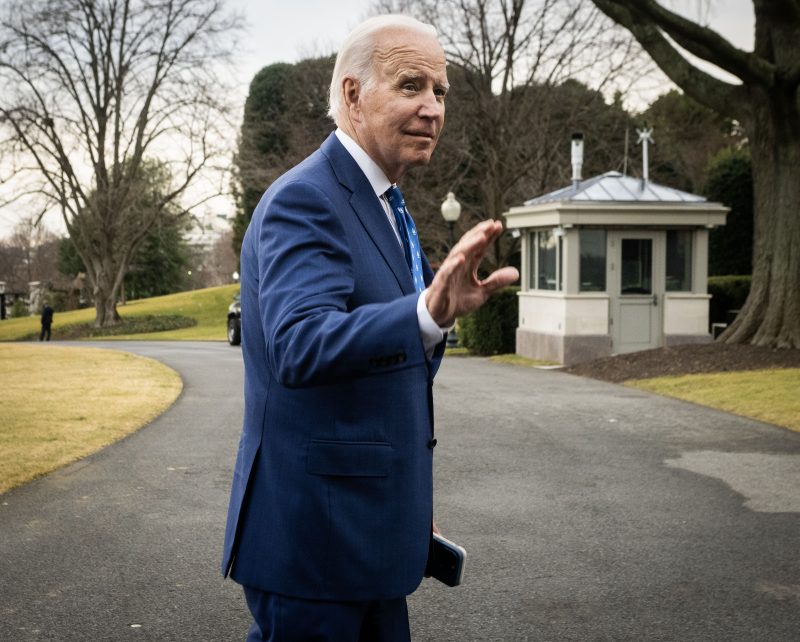As President Biden begins a period of divided government that threatens to enmesh his presidency in investigations and high-stakes brinkmanship, the White House is pursuing a recalibrated strategy for navigating the next two years that will seek to temper potentially explosive clashes with bipartisan cooperation and an aggressive promotion of his legislative accomplishments.
Senior White House officials are planning to counter an expected onslaught of oversight by Republican lawmakers by working with the GOP behind the scenes on bipartisan bills as Biden gears up for a reelection bid he has said he intends to wage. The strategy also involves moving aggressively to implement and publicly celebrate pieces of the multi-trillion-dollar rush of legislation already passed over the past two years, providing a counterweight to GOP moves to probe missteps and controversies from the same period.
A version of this split screen was on display over the past week — as Biden touted a bipartisan infrastructure law with Senate Minority Leader Mitch McConnell (R-Ky.) while House Republicans engaged in a bitter public stalemate over the speakership that prevented them from immediately moving ahead with their plans. Similar events by the president and his top officials are expected on a weekly basis as the Biden administration tries to sell its achievements.
White House aides have begun to describe this phase as “Chapter 2” of Biden’s presidency, framing it as a period of mild and expected transition rather than drastic change, according to senior administration officials, who spoke on the condition of anonymity to discuss internal strategy. For Biden, 2023 is shaping up to be a pivotal test of whether he can outmaneuver his political foes while also appeasing Democratic base voters who have argued that the octogenarian president’s gentlemanly approach to politics is a relic of a bygone era. Biden’s approval ratings remain mired in the low-to-mid 40s, a perilous position to be in as he kicks off the second half of his term.
“We’ve made some real progress in the last going on two years now,” Biden said during a Cabinet meeting Thursday, the third consecutive day that Rep. Kevin McCarthy (R-Calif.) failed to secure enough votes to become Speaker, a title he secured early Saturday. “But now we need to focus on implementing the big laws we actually passed so that the American people can feel the benefits of what we’ve done.”
Biden’s comments, coupled with the emerging White House strategy, shows how they are aiming to strike a difficult balance between presenting him as a moderate statesman and a champion of some sweeping policies he enacted during the last two years. While the infrastructure bill won votes from both parties, Biden also spearheaded a covid relief bill and health and climate package passed solely with Democratic support.
The comments also amount to an acknowledgment that his legislative ambitions will, by necessity, be more modest than those he pursued in his first two years in office. Biden faced criticism during that time from Republicans and even some Democrats who charged he had veered too far left with his aims.
Despite the GOP dysfunction in the early days of the new Congress, the president faces a formidable opponent in the legislative branch. Republicans have pledged to use their new, if narrow, House majority to frustrate his plans and cast him before the American public as too old and outwitted to deserve a second term.
Top House Republicans have pledged to use their new powers in ways that could lead to some uncomfortable moments for the White House, from subpoenas and public hearings to showdowns over funding the government and defaulting on the nation’s debt.
The president’s ability to maneuver in a divided Washington could determine whether he is reelected in 2024, or whether his relatively productive first two years in office are ultimately eclipsed by a second half marked by political bickering and chaos, said Russell Riley, a presidential historian at the University of Virginia’s Miller Center.
“You’re not going to get much lawmaking done over the next two years. I don’t think anybody expects that to happen,” said Riley, who has written books about other presidents who confronted divided government while seeking reelection. Riley added that a silver lining for Biden is the “carnival atmosphere” among Republicans in the House.
The White House blueprint for the next two years, “Chapter 2,” is not unlike President Barack Obama’s reference to his final two years in office as “the fourth quarter.” But while Obama emphasized using “a pen and a phone” and other executive authorities to bypass a Republican-led Congress at the end of his presidency, Biden is promising bipartisanship as he prepares for a reelection bid.
While the Republican takeover of the House likely dooms many of the most ambitious parts of Biden’s agenda, his legislative affairs team sees a pathway for striking deals on a handful of issues where both parties have shown an interest in cooperation. The president and his aides have pointed out that many of the initiatives he signed into law don’t kick in until this year.
“The big laws we passed were consequential, but they’re basically promises,” Biden said this past week.
Administration officials hope to use the implementation of these laws as a springboard into additional bipartisan action. As Republicans see the benefits of laws passed in their districts, the thinking goes, they will be more open to expanding on things like low-price insulin for all or specific infrastructure projects.
For their part, Republicans in the House have cast the new congressional term as a moment of reckoning for Biden and his fellow Democrats, promising major changes and casting doubt on how much Biden’s message of unity will resonate after the president enacted much of his legislative plans with only Democratic votes.
“As the clock runs out on Democrats’ one-party rule in Washington, House Republicans will hold the line,” Rep. Elise Stefanik (R-N.Y.), the third-ranking House Republican, told reporters last month. “On day one in the majority, we will start reining in the Biden administration and deliver on our commitment to America.”
House Republicans have pledged to use their new authorities to investigate the business dealings of Biden’s son, Hunter, as well as a range of administration policies, including the chaotic withdrawal from Afghanistan, the handling of the coronavirus pandemic, actions by the Department of Justice and the increase in migration at the southern border.
Biden’s aides point to the Republicans’ narrow margin for error, highlighting that many of the lawmakers who will make up the party’s slim 222-213 House majority hail from districts Biden carried in 2020. They also point to the fact that Democrats expanded their Senate majority, giving the president a smoother pathway to confirming judicial appointments and other nominations.
After his party outperformed expectations during the midterm elections, Biden has provided a glimpse of the kind of approach he will pursue during the second half of his term. After a post-election news conference in which he pledged to work across the aisle, Biden traveled to Asia on a week-long foreign policy swing. He has continued to lean in on foreign affairs — an area where presidents have broad unilateral authority — holding a state visit with France, approving a prisoner swap with Russia, hosting African leaders at the White House and backing more weaponry for Ukraine during a meeting with its president, Volodymyr Zelensky.
His 2023 schedule could include a half-dozen foreign trips, with a summit in Mexico in the coming days and a visit to Africa later in the year adding to the traditional schedule of global leader forums.
Domestically, Biden has begun traveling to battleground states to tout legislation passed during his first two years in office and to remind Americans that much of the economic impact of those laws will be felt in the months to come.
On Wednesday, Biden visited Kentucky to tout a bridge project funded by the bipartisan $1.2 trillion infrastructure bill he signed in 2021. He was joined by McConnell, Ohio Gov. Mike DeWine (R) and Ohio Sen. Sherrod Brown (D-Ohio) at the event near the Kentucky-Ohio border.
Citing legislation to combat climate change, a gun safety bill, a $52 billion effort to boost domestic manufacturing and a cap on the price of insulin for seniors, Biden told reporters after the election that he did not plan to make major changes to his approach in the next two years. He said Americans’ anxieties about the economy and the broader state of the country will begin to ease as the impact of his agenda becomes more widespread.
“The more they know about what we’re doing, the more support there is,” he said.
The president has acknowledged that some of the policies he has not been able to enact yet face long odds in the new Congress, noting for example that a bill to protect abortion rights is unlikely to clear a GOP-led House. Other major campaign promises, from universal preschool to an assault-weapons ban to universal paid leave are also long shots in a divided Congress.
Still, Biden and his aides have pointed to the recent end-of-year rush of legislating as evidence that the two parties are still capable of collaboration. He has praised Republicans for voting to protect same-sex and interracial marriage and avert a rail strike and has thanked Senate Republicans for negotiating in good faith on a $1.7 trillion one-year spending bill that averted a government shutdown.
But both parties see clashes to come. Last month, McCarthy unveiled a lengthy list of areas where his party plans an extensive oversight campaign, ranging from Biden’s policies on China to administration spending practices that Republicans say have produced historic inflation and economic uncertainty.
“It doesn’t matter whether we have a 30-seat majority or a five-seat majority, we get the same size gavel,” McCarthy said in December. “We’re going to use it in the manner that the American public wants us to.”
McCarthy has called for Homeland Security Secretary Alejandro Mayorkas to resign or face potential impeachment, a sign that Republicans plan to move swiftly to make the crisis at the border a larger political liability for Biden. Record numbers of people have crossed the southern border in recent months, and the potential expiration of Title 42, a pandemic-era immigration restriction, threatens to make the issue even more politically fraught this year. Biden announced new immigration restrictions Thursday that reflect back to the political center.
“The control of the border is lost right now,” McCarthy told reporters outside the White House after his post-election meeting with Biden. “We will have an investigation of why the border has become the situation that it is, and not allow them to continue along the same path.”
It remains unclear how successful McCarthy will be in shepherding his caucus as it seeks to damage Biden’s political brand ahead of the 2024 election. Many of the holdouts who initially voted against his speakership have called on him to take an even harder line against Biden’s agenda.
Some Republicans have called on the party to use the prospect of government shutdowns or an unprecedented default on the nation’s debt as leverage to extract concessions and spending cuts from Democrats. Others have said McCarthy should be willing to consider impeachment or other tough measures against the president.
White House allies and opponents agree that Republicans’ focus on investigations could make it difficult to achieve major bipartisan deals in Congress over the next two years.
“For all intents and purposes, the Biden legislative agenda ends,” said Doug Heye, a Republican strategist who worked with House leadership after the GOP takeover in the 2010 midterms. “That was true of Obama, that was true of Trump.”
Heye added that the kind of Congress Biden knew during his 36 years as senator no longer exists. The retirements of lawmakers such as Sen. Richard C. Shelby (R-Ala.) means there will be fewer people that Biden has worked closely with still around to strike deals, he said. They have been replaced by a new generation of social media savvy lawmakers who see more value in attacking Biden rather than working with him, Heye said.
The White House plans to cooperate with congressional investigations on areas of interest it deems legitimate — including policy issues and administration actions — while downplaying inquiries into matters it views as political motivated. For example, the investigation into Hunter Biden is likely to receive less engagement from the White House than a probe on the administration’s handling of wars in Afghanistan and Ukraine, officials said.
But even as the White House staffs up and prepares for a two-year stretch of congressional inquiries, some see the combative stance House Republicans are taking as an opportunity the president can seize on to bolster his reelection effort.
Biden, who allies expect to announce a reelection bid and deliver a State of the Union address in the coming weeks, plans to offer a sharp contrast between his policies and that of “extreme MAGA” lawmakers. The rising prominence of figures such as Rep. Marjorie Taylor Greene (R-Ga.) in the House — which the White House has begun highlighting in statements and tweets — offers Biden a foil to campaign against as he casts himself as a defender of democracy.
White House aides believe Biden’s insistence on calling out far-right Republicans during the midterms helped bolster Democrats in key races against Trump-backed challengers. As the president gears up for another race — one that could again place him against Trump — he plans to continue contrasting his brand of politics with that of his predecessor, aides said.
Biden has already begun responding more frequently and forcefully to Trump’s latest actions, which include dining with antisemites, suggesting that the Constitution be terminated and launching $99 digital trading cards featuring images of himself.
“I had some MAJOR ANNOUNCEMENTS the last couple of weeks, too…” Biden wrote on Twitter last month, a day after Trump floated a “MAJOR ANNOUNCEMENT” that turned out to be the trading cards. Biden went on to list some of his recent accomplishments, including signing the Respect for Marriage Act and announcing thousands of new jobs at a facility in Arizona.








